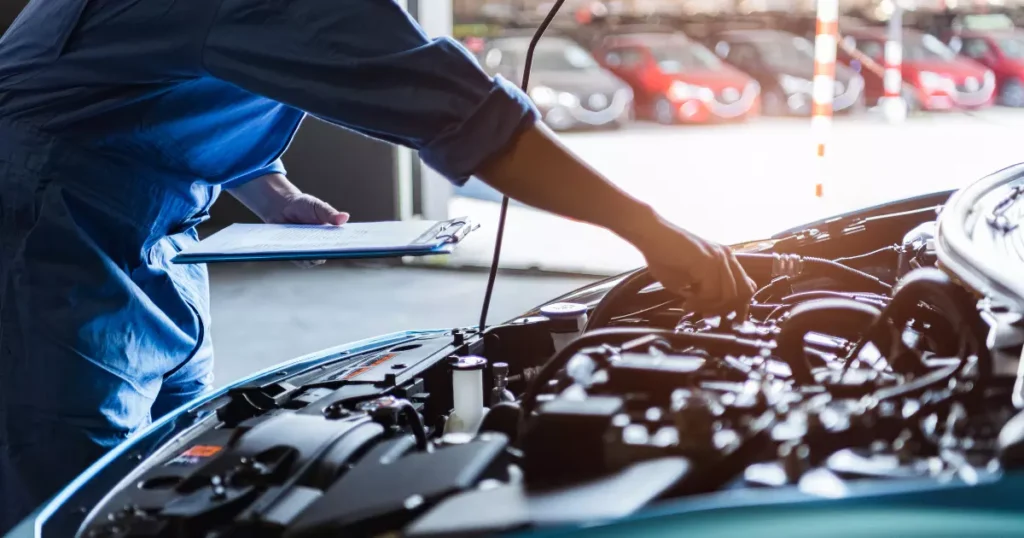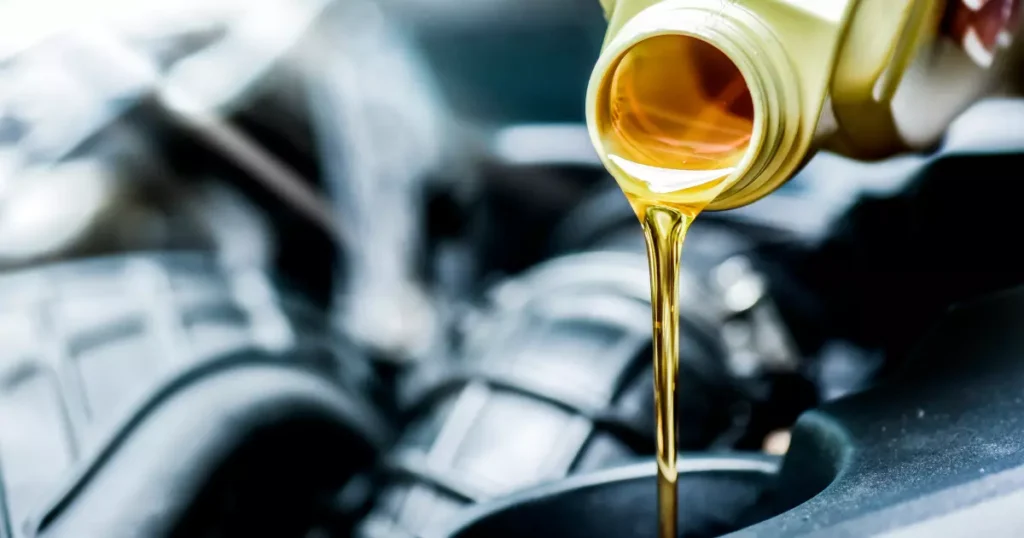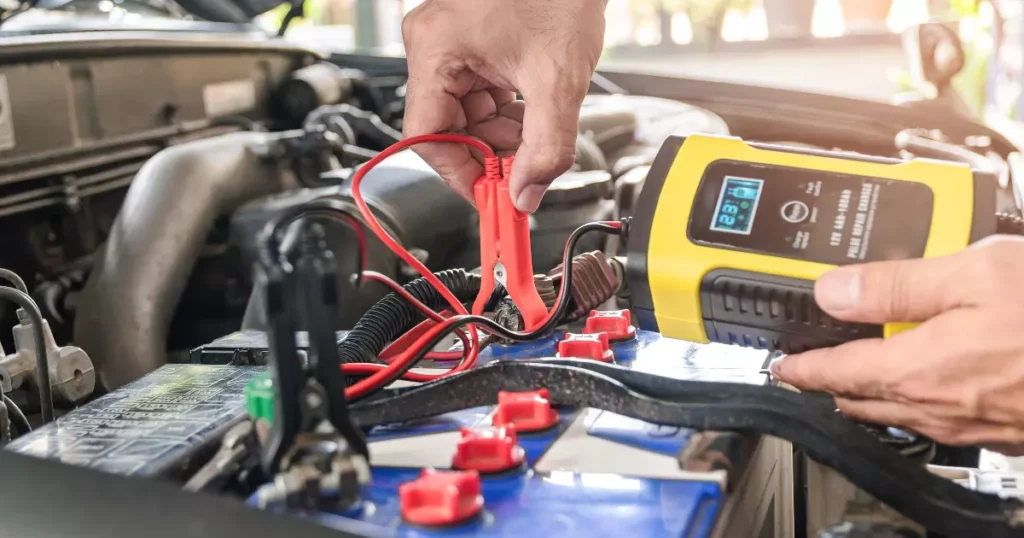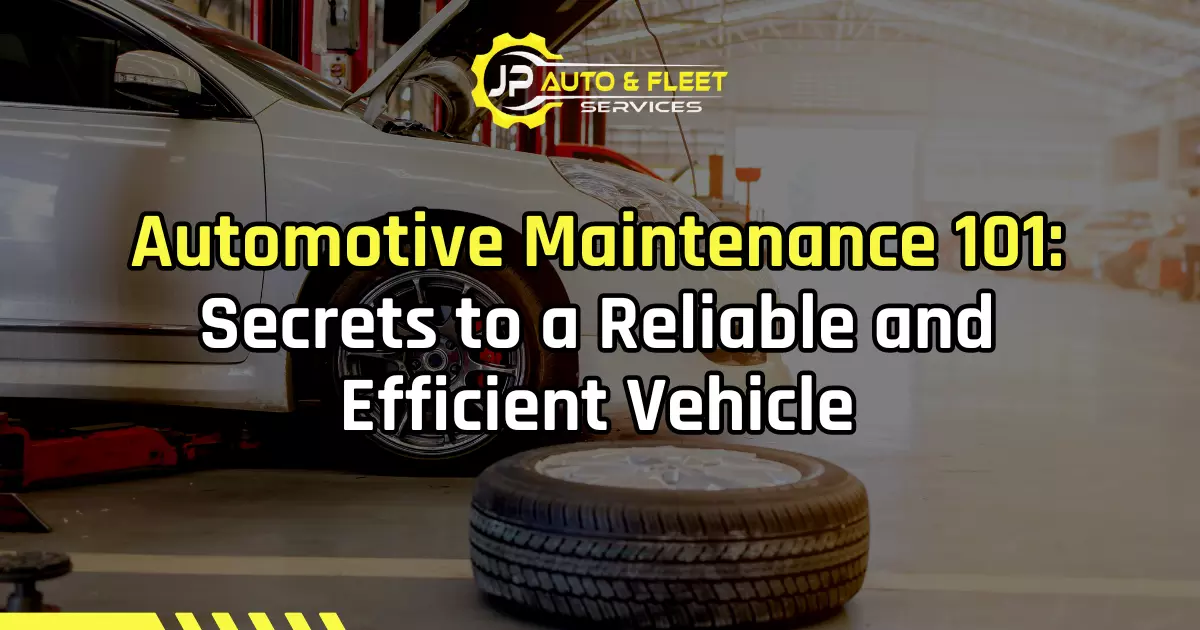In this guide, we’ll walk you through essential automotive maintenance tips that every vehicle owner should know. Whether it’s learning how to change your oil, understanding the importance of tire rotation, or recognizing the signs of a failing battery, these tips are designed to help you stay ahead of potential issues. Let’s dive in!
What are The Basics of Automotive Maintenance?

The basics are essential for anyone looking to keep their car in peak condition and avoid costly repairs. Regular and preventative maintenance extends the life of your vehicle and enhances its performance and safety. Let’s dive into the specific tasks that every car owner should be familiar with. You may also check out our article on vehicle service tips to discover more ways to maintain your auto.
Read also: Fleet Car Maintenance: 5 Expert Tips to Maximize Performance
Regular Oil Changes
Oil changes are a cornerstone of vehicle maintenance. Engine oil lubricates the moving parts, reduces friction, and prevents overheating. Regularly changing the oil and replacing the oil filter ensures optimal engine performance and longevity. Follow your vehicle manufacturer’s recommendations, typically every 3,000 to 5,000 miles.
Tire Maintenance
Tire maintenance is vital for safety and fuel efficiency. Check tire pressure monthly to maintain proper levels and ensure even wear. Inspect the tread depth and look for signs of damage. Regular tire rotation and alignment help extend tire life and improve vehicle handling.
Read also: When to Replace Your Tires
Battery Care
A well-maintained battery ensures reliable starts and prevents unexpected breakdowns. Regularly inspect the battery terminals for corrosion and secure connections. Test the battery’s charge level periodically, especially before long trips. Clean the terminals and consider replacing the battery every 3-5 years.
Read also: How to Change a Car Battery: 10 Easy Guides for Every Driver
Fluid Checks
Fluid checks are essential for a variety of systems in your vehicle. Regularly inspect the levels of transmission fluid, brake fluid, power steering fluid, and coolant. Maintaining proper fluid levels prevents system failures and costly repairs. Replace fluids as recommended by the manufacturer to ensure optimal performance.
Brake Maintenance
Brake maintenance is critical for safety. Inspect brake pads, rotors, and brake fluid regularly. Look for signs of wear, such as squeaking or reduced braking efficiency. Replace brake components as needed to maintain effective braking and prevent accidents.
Read also: Brake Rotors: How to Tell if They Need to Be Replaced
Filter Replacements
Filters play a key role in maintaining your vehicle’s efficiency and performance. Replace the air filter to ensure clean air intake to improve fuel efficiency. Change the oil filter during oil changes to keep the engine oil clean. Don’t forget the cabin filter, which ensures good air quality inside the vehicle.
Lights and Wipers
Proper visibility is crucial for safe driving. Regularly check all exterior lights, headlights, brake lights, and parking lights. Replace any burnt-out bulbs immediately. Ensure your windshield wipers are in good condition and replace them if they streak or leave smudges.
Belts and Hoses
Belts and hoses are vital for the operation of your vehicle’s engine and various systems. Inspect belts for signs of wear, such as cracks or fraying. Check hoses for leaks and proper connection. Replace worn or damaged belts and hoses to avoid breakdowns and maintain vehicle reliability.
How Can Regular Oil Changes Improve Your Car’s Performance?

Fresh engine oil ensures that all moving parts within the engine are properly lubricated to reduce friction and prevent wear. This lubrication is crucial for maintaining the engine’s efficiency and longevity, particularly in light trucks and manual transmission vehicles.
Changing the oil also helps in removing contaminants that accumulate over time. Dirt, metal particles, and other debris can enter the engine oil. These potentially cause damage to internal components. Replacing old oil with fresh, clean oil during routine maintenance ensures these harmful particles are flushed out. This keeps the engine running smoothly.
As the engine operates with less friction and cleaner oil, it doesn’t have to work as hard which results in improved fuel economy. This is particularly beneficial in the long run, as it can lead to significant savings on fuel costs.
Furthermore, timely oil changes support the proper operation of various engine systems. Fresh oil helps maintain the right temperature by dispersing heat more effectively, which prevents it from overheating. It also ensures the proper function of the air conditioning system. Plus, a well-maintained engine can support auxiliary systems more efficiently.
Finally, keeping up with periodic maintenance such as oil changes allows for regular safety inspections. During an oil change, automotive technicians often check other vital fluids like transmission fluid and transfer case fluid, along with performing general auto repair checks. This proactive approach helps in identifying potential issues early and prevents costly auto body repair. With this, you can make sure your vehicle remains safe and reliable on the road.
What are The Signs of A Failing Battery?

A failing battery can leave you stranded at the most inconvenient times. Recognizing the early warning signs can prevent this and avoid the frustration of a dead engine. Here are some indicators that can be subtle that lead to more severe problems if left unaddressed.
Slow Engine Crank
The first sign of a failing battery is a slow engine crank. When you turn the key, the engine cranks sluggishly and takes longer to start. This happens because the battery doesn’t have enough power to start the engine efficiently. Addressing this early can prevent more serious engine issues.
Dim Lights and Electrical Issues
Dim lights and malfunctioning electrical systems often point to a weak battery. Headlights, interior lights, and dashboard indicators might appear dim or flicker. This decrease in electrical performance indicates the battery is struggling to supply adequate power. Ensuring your battery is fully charged can restore proper operation to these systems.
Warning Light
A warning light on the dashboard is a clear sign of battery problems. The check engine light or a dedicated battery warning light may illuminate. This alert is your vehicle’s way of telling you there’s an issue with the battery or charging system. Don’t ignore this warning and get your battery checked by a professional.
Corroded Battery Terminals
Visible corrosion on the battery terminals can impede the battery’s performance. Corrosion appears as a white, ashy substance on the terminals and can disrupt the electrical connection. Regularly cleaning the terminals can prevent this build-up and ensure a strong connection. Using a mixture of baking soda and water is an effective cleaning method.
Swollen Battery Case
A swollen or bloated battery case is a serious sign of internal damage. This usually results from excessive heat or overcharging, which can lead to a dead battery. If you notice a swollen battery case, replace the battery immediately. Continuing to use a swollen battery can be dangerous and lead to further vehicle repairs.
Old Age
Batteries have a limited lifespan, typically between three to five years. As a battery ages, its ability to hold a charge diminishes. If your battery is within this age range, it’s more prone to failure. Regularly testing your battery’s charge can help determine when it’s time for a replacement.
Frequent Jump-Starts
Needing frequent jump-starts is a clear sign your battery is failing. If your car often requires a jump-start to get going, the battery is likely unable to hold a charge. This situation can lead to a dead battery, leaving you stranded. Replacing the battery can resolve this issue and restore your car’s reliability.
How to Prevent Battery Failure?
Preventing battery failure involves proactive steps that can extend the life of your battery and ensure your car starts reliably. Maintain the health of your battery and avoid unexpected vehicle repairs with these habits. Here’s how you can keep your battery in top condition:
Regular Testing and Inspection
Testing and inspecting your battery regularly can help identify potential issues before they become serious problems. Use a multimeter to check the voltage; a healthy battery should read around 12.6 volts when fully charged. Visually inspect the battery for any signs of damage, such as cracks or leaks. Regular inspections can prevent a dead engine due to a failing battery.
Keep Battery Terminals Clean
Clean battery terminals are essential for maintaining a good electrical connection. Corrosion on the terminals can cause a decrease in smoothness in your vehicle’s performance. Use a mixture of baking soda and water to clean the terminals, and apply petroleum jelly to prevent further corrosion. Keeping terminals clean ensures that power flows efficiently from the battery to the vehicle systems.
Drive Your Car Regularly
Regular driving keeps the battery charged and prevents it from losing its charge over time. Short trips can drain the battery without giving it enough time to recharge. Aim to drive your car for at least 20 minutes a few times a week to keep the battery healthy. This routine helps in maintaining the overall health of your automobile engines and other components.
Avoid Extreme Temperatures
Extreme temperatures, hot and cold, can significantly affect battery performance. In hot weather, battery fluid can evaporate which leads to reduced capacity. In cold weather, the battery’s ability to hold a charge decreases. Park your car in a garage or shaded area to protect it from extreme temperatures, which helps in avoiding premature battery wear.
Turn Off Electronics When the Engine Is Off
Leaving electronics on when the engine is off can drain the battery quickly. Make sure to turn off lights, radio, and other electronic devices when the car is not running. This simple habit can prevent unnecessary battery drainage and extend its life. It’s a crucial part of routine mechanical maintenance.
Check the Alternator
The alternator charges the battery while the engine is running, so a malfunctioning alternator can lead to a dead battery. Have your alternator checked during regular vehicle repairs to ensure it’s functioning correctly. A faulty alternator can also affect other vehicle systems and lead to more extensive repairs.
Secure the Battery
Ensure the battery is securely fastened in its tray to prevent vibrations and potential damage. An unsecured battery can move around and can cause connections to loosen or the battery to crack. Regularly check the battery’s mounting to ensure it’s secure. This helps in maintaining the integrity of the drivetrain and other systems.
Use a Battery Maintainer
If you don’t drive your car often, consider using a battery maintainer to keep the battery charged. A maintainer provides a steady, low-level charge that keeps the battery from losing power over time. This device is especially useful for cars that are stored for long periods. Using a battery maintainer ensures your battery is always ready to go and prevents the hassle of a dead battery.
Where Can You Find Trusted Options for Automotive Maintenance?

Choose the right service provider that can make all the difference. Understanding where to find these services and what each offers will help you make an informed decision. Ensure your vehicle receives the best care possible.
Dealership Service Centers
Dealership service centers are often the go-to choice for many vehicle owners. These centers have technicians who are specifically trained in your car’s make and model. They use original equipment manufacturer (OEM) parts, which are designed to fit and function perfectly with your vehicle. This specialized expertise and access to manufacturer-specific information ensure top-quality service.
Independent Auto Repair Shops
Independent auto repair shops offer a more personalized touch. These shops can often provide lower prices than dealership service centers while still delivering high-quality work. Many independent shops, like JP Auto & Fleet Services, offer expert full-service auto care, including diagnostics, fleet repairs, and maintenance. Their mechanics are certified, which ensures they have the skills and knowledge to handle a wide range of vehicle issues.
Chain Auto Repair Shops
National chains like Pep Boys, Firestone, and Midas provide consistent service and convenience. These shops often have multiple locations and make it easy to find a branch near you. They offer a variety of services, from oil changes to brake repairs. They also have the benefit of warranties that are honored at any of their locations. This reliability makes them a popular choice for many car owners.
Online Resources and Review Sites
Online resources and review sites like Yelp, Google Reviews, and Repair Pal are invaluable tools for finding reputable auto repair services. These platforms provide customer reviews and ratings, giving you insights into the experiences of others. By reading reviews, you can gauge the quality of service, professionalism, and reliability of different shops in your area. This research helps you make an informed choice based on real customer feedback.
Automotive Clubs and Associations
Organizations like AAA offer approved auto repair networks and ensure you receive high-quality service. These networks consist of shops that have met strict standards for performance and customer service. As a member, you also benefit from discounts and additional services, such as roadside assistance. This combination of quality assurance and perks makes automotive clubs an excellent resource.
Local Mechanics and Mobile Services
Local mechanics and mobile services provide convenient and often cost-effective solutions. Local mechanics typically build their reputation within the community, offering trustworthy and personalized service. With mobile maintenance services, mechanics come to your location. This will save you the time and hassle of driving to a shop. These options are particularly useful for busy individuals who need flexible and efficient automotive care.
Frequently Asked Questions
Now, here are some of the common questions that can help you know more about automotive maintenance.
Why is Brake Maintenance Essential for Safety?
Properly functioning brakes are essential for stopping your vehicle quickly and effectively in various driving conditions. Regular inspections can identify worn brake pads, which, if not replaced, can lead to longer stopping distances and potential accidents. The brake fluid also plays a vital role. It needs to be at the correct level and free of contaminants to ensure smooth and responsive braking.
Ignoring brake service maintenance can lead to severe consequences, including brake failure. This can result in costly repairs and even more significant risks to your safety. Regular brake checks also allow for the inspection of other components, such as rotors and calipers. These are crucial for the proper operation of the braking system. Keeping your brakes in top condition guarantees you can stop your vehicle reliably whenever needed.
How Do Fluid Checks and Changes Impact Your Vehicle’s Longevity?
Each fluid in your car plays a crucial role in maintaining the health of various systems. Engine oil lubricates and cools the engine to prevent wear and overheating. Transmission fluid ensures smooth shifting and reduces friction within the transmission and extends its lifespan.
Checking coolant levels is essential to prevent the engine from overheating and to maintain optimal operating temperatures. Brake fluid is critical for safe braking. This ensures it’s at the proper level and free from contaminants to maintain an efficient brake. Power steering fluid enables easy steering and prevents damage to the power steering pump. Regularly checking and topping off these fluids, as well as performing periodic changes can prevent expensive repairs. Plus, this keeps your vehicle running smoothly for years to come.
How Can Regular Filter Replacements Enhance Engine Efficiency?
Clean filters, such as air, oil, and fuel filters, play a significant role in keeping contaminants out of your engine. Air filters prevent dust, dirt, and debris from entering the engine, which allows for proper air-fuel mixture and combustion. This improves fuel efficiency and engine power.
Oil filters remove particles and sludge from the engine oil and ensure that only clean oil lubricates the engine’s moving parts. This reduces friction and wear, prolonging the engine’s lifespan. Fuel filters keep impurities from entering the fuel injectors. This promotes efficient fuel combustion and prevents clogs that can hinder performance.
What are The Best Practices for Maintaining Your Car’s Cooling System?
Start by regularly checking the coolant levels to make sure they are within the recommended range. Low coolant levels can lead to overheating. This can cause serious damage to the engine and other components. Use a 50/50 mix of antifreeze and water, as this combination effectively prevents corrosion and boiling.
Next, inspect the radiator and hoses for any signs of leaks or wear. A damaged radiator or cracked hose can lead to coolant loss and overheating. Replace any worn-out parts immediately to avoid potential breakdowns. Moreover, keep the radiator clean and free from debris. Dirt and bugs can clog the radiator fins, reducing its cooling efficiency.
Regularly flush and refill the coolant according to your vehicle manufacturer’s recommendations. Over time, the coolant can become contaminated and lose its effectiveness. Flushing the system removes any buildup of rust, scale, and other deposits that can impede coolant flow. This periodic maintenance ensures your cooling system operates at its best.
Finally, check the condition of the water pump and thermostat. The water pump circulates coolant through the engine, and a faulty pump can cause overheating. The thermostat regulates the coolant flow and maintains the engine’s optimal operating temperature. Replacing these components when they show signs of wear can prevent cooling system failures.
How Does Regular Maintenance Save You Money in the Long Run?
Routinely checking and maintaining key components like engine oil, transmission fluid, and brake fluid ensures your car operates efficiently and reliably. This proactive approach helps you avoid the high costs associated with major breakdowns and emergency repairs.
When you perform regular maintenance, such as changing air and oil filters, you improve your vehicle’s fuel efficiency. Clean filters allow the engine to breathe better to reduce strain and enhance performance. This saves money on fuel and minimizes wear and tear on engine parts. Plus, it reduces the need for expensive replacements.
Regular inspections can catch small issues before they escalate into larger, more expensive problems. For example, addressing minor leaks in the coolant system. This can prevent engine overheating and costly engine damage. Similarly, maintaining proper tire pressure and alignment prevents uneven tire wear and can save you money on premature tire replacements.
Moreover, a well-maintained vehicle retains its value better than one that is neglected. If you decide to sell or trade-in your car, a documented history of regular maintenance can boost its resale value. This means you can recoup some of your maintenance costs when upgrading to a new vehicle.
Wrapping Up
Maintaining your vehicle’s performance and reliability hinges on understanding the basics of automotive maintenance. Regular oil changes, tire maintenance, battery care, fluid checks, brake maintenance, filter replacements, lights and wipers, and inspecting belts and hoses are all crucial tasks. These routine checks help prevent costly repairs. These enhance fuel efficiency and ensure safety on the road. Recognizing the signs of a failing battery and taking preventive measures can save you from unexpected breakdowns. Moreover, finding a reliable automotive maintenance service, whether through dealerships, shops, or online resources, ensures your car receives the best care possible.
Looking for the best automotive service and repair? Look no further than JP Auto & Fleet Services. Our expert mechanics are dedicated to keeping your vehicle in top condition. We provide fleet maintenance, oil change service, brake services, and vehicle diagnostics. Our comprehensive services ensure your car runs smoothly and safely. You can find us serving the entire Dallas-Fort Worth area. Together, let us prevent issues like brake fade and ensure optimal performance.
Choose us for our extensive experience, reliable service, and commitment to excellence. Let us help you maintain your vehicle’s safety and efficiency. Contact us today at 214-836-9333 to schedule your service and experience the best in automotive care.


